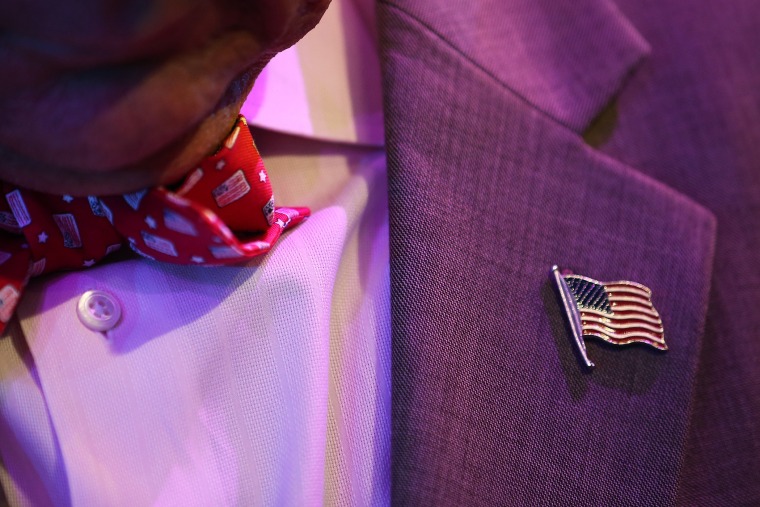The explosion in outside spending since the Supreme Court’s Citizens United decision has led to “dramatic changes in the political landscape,” according to a detailed new report based on interviews with dozens of current and former members of congress and political operatives.
One of the report’s key findings is that members of Congress say they see the existence of outside groups with the resources to use large political expenditures as a threat, effectively saying "Toe the line on the issues we care about, or we’ll come after you."
The report also shows that the legal ban on coordination between campaigns and outside organizations often has little impact in practice. Campaigns have developed sophisticated tactics — which they detailed for the report’s authors — that let them get around the spirit of the coordination ban, while technically staying within the letter of the law.
The report, released Wednesday morning, was conducted by Daniel Tokaji, an election law scholar at the Ohio State University, and Renata Strause, a Graduate Research Fellow there.
In 2010, the Supreme Court ruled that corporations can spend unlimited amounts on politics, via independent expenditure campaigns. Since then, a flood of outside money has overwhelmed the system, giving wealthy donors a greater say in elections than they’ve had in decades. News reports have established beyond a doubt that the landscape of campaign finance has been radically reshaped since the ruling. But the Tokaji and Strause report aims to offer a picture of the real-world effects of that change, both in terms of running campaigns and governing—a subject that can’t easily be documented with numbers and dollar amounts alone.
"If you look at who makes up these organizations, on all sides, they’re loaded with political operatives"'
In an interview with the report’s authors, Joe Walsh, an Illinois Republican who served in Congress from 2011 until last year, explained the intimidating effect that some of the top outside groups on the right have on sitting Republican lawmakers.
“The fact that the Club [for Growth] or Heritage [Action] or Freedom Works or any of these groups came pout for or against that Farm Bill—members openly talk about it,” Walsh said. “They’re afraid of a potential conservative challenge.”
The effect, say those involved, is to discourage deal-making and moderation—a trend that’s been impossible to miss among Republicans in particular in recent years.
“No one’s saying, ‘here’s $50 million for a good compromise,” Dan Boren, a former Democratic member from Oklahoma.
As for the coordination issue, the ability of outside groups to hire experienced political hands who often have working relationships with staffers from the campaigns they’re supporting means the ban on coordination does increasingly little in practice.
“This whole idea, well, oh, they don’t coordinate, therefore it’s really independent, is just nonsense,” Kent Conrad, a former Democratic senator from North Dakota said. “If you look at who makes up these organizations, on all sides, they’re loaded with political operatives.”
But it’s the fundraising sphere where the idea that there’s no coordination between campaigns and outside groups really falls apart, the report found. Here’s one scheme described by a campaign operative to get around the ban:
You have a donor who wants to do a lot more than just max out to your campaign. One day, you get a call from someone who asks if you have any maxed out donors who might also like to give to a group that makes independent expenditures. They say, “If you have anyone who would like to help your candidate, you can let them know that Sally from Super PAC XYZ will give them a call and that they should make a decision about what Sally says and that you have no control over it.” So the Member calls and says “Hey, I know you’re maxed out – and I can’t take any more money from you – but there’s this other group. I’m not allowed to coordinate with them, but can I have someone call you?” Then you give the list of your maxed donors to Sally. Sally calls and says “Hi Max Donor – I got your name from Rep. Joe Smith’s campaign– I don’t know if they’ve told you that there’s this other thing that you do can do to help. I know you want to help Joe and so if you give to our group, we’ll be able to help Joe out.” The more sophisticated the donor, they know exactly what that call is. After the !ast time, they’re looking for it in future cycles and make a note in the memo line of the check – “Go Joe Smith!”
Other campaigns, according to the report, have used simpler methods: They’ve simply shared lists of their highest donors with supportive outside groups, before the names were reported to the FEC. Of course, that’s information the campaign must make public each quarter, so disclosing it early isn’t illegal. But for the outside group that gets the list early, it’s invaluable.
